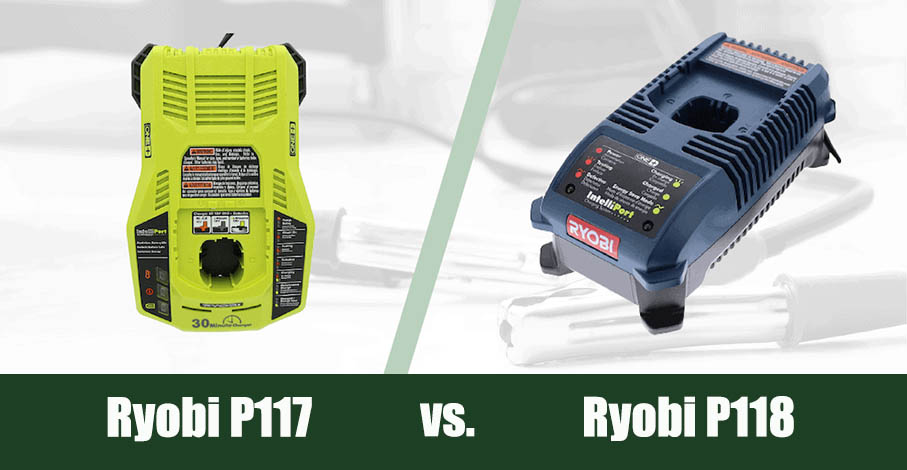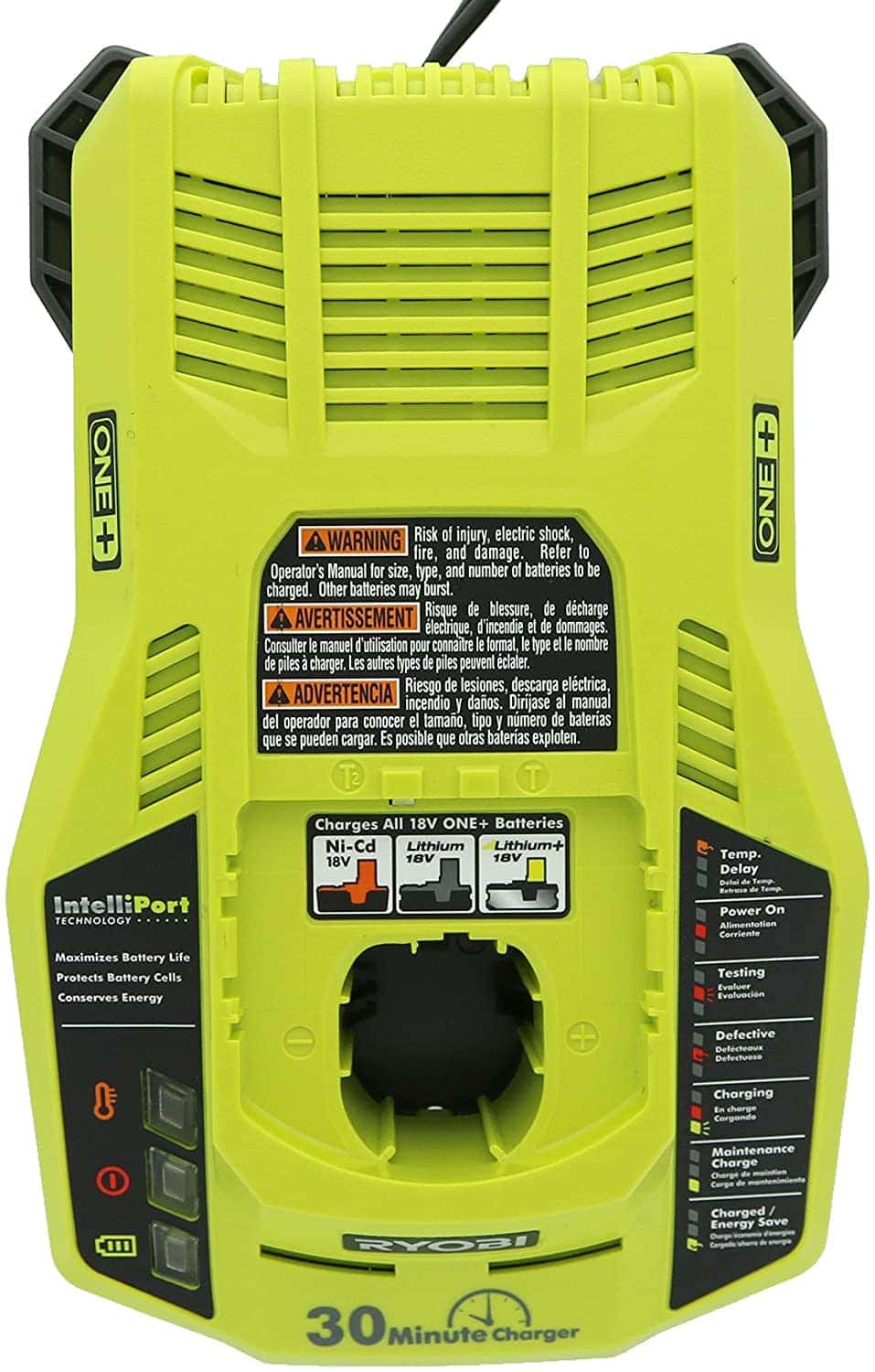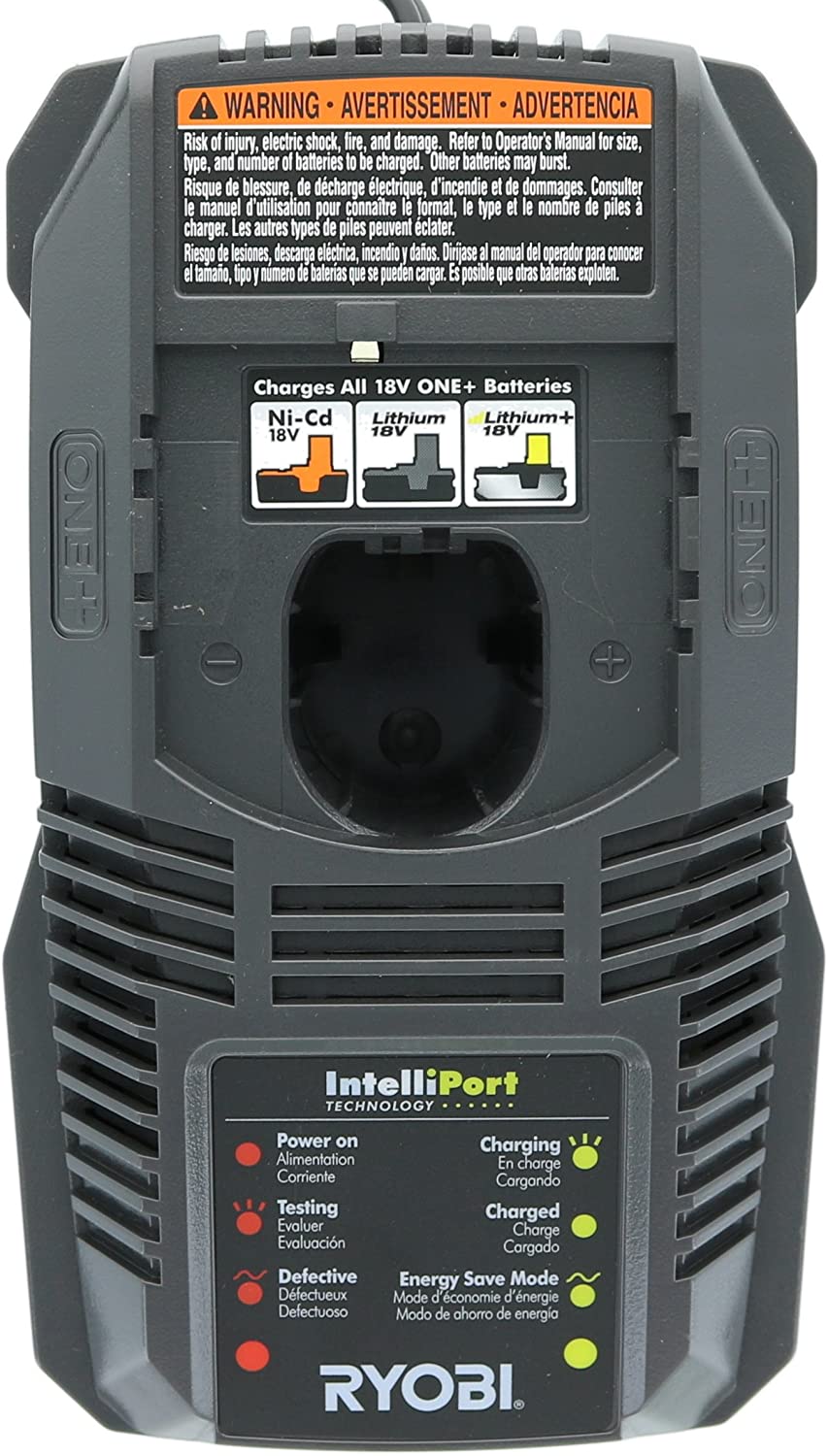Ryobi P117 vs P118: Which One’s Best?
-

- Last updated:


| Rating | Image | Product | Details | |
|---|---|---|---|---|
The Winner
 |
 |
Ryobi P118 |
|
CHECK PRICE |
The Runner-up
 |
 |
Ryobi P117 |
|
CHECK PRICE |
Review Summary
Whenever you have lithium-ion batteries, you need to buy a device to charge them. The Ryobi P117 and P118 are two popular choices. Given that they are in the same line, both products offer similar capabilities, making it difficult to know which one is best.
To put it plainly, the Ryobi P117 is the best option between the two. It offers several features that make it more efficient, user-friendly, and powerful. More specifically, it comes with features like a charging gauge, temperature indicator, and more. Because of these features, expect to pay more for the P117.
The Ryobi P118 is a great charger too, but it comes with fewer features than the P117. Since this is the battery charger that comes with Ryobi sets, it is very basic. It offers stable and reliable charging power at a more affordable price.
With this in mind, you may opt for the P117 if you want a fast-acting, highly efficient charger. In contrast, the P118 might be for you if you want an affordable charger without all the bells and whistles.
Still, there’s more to the story. In this article, we take a critical look at each set, compare them to one another, and consider other users’ experiences with them. Read on to find out more.
At a Glance
Let’s look at the key points of each product.
- Wall mounting
- Suitable for Ryobi’s lithium-ion and Ni-Cd batteries
- Includes a charging gauge
- Includes a temperature indicator
- Includes Intelliport technology that maximizes battery efficiency
- Wall mounting
- Suitable for Ryobi’s lithium-ion and Ni-Cd batteries
- Includes LED charge indicators
- One+ compatible
Overview of the Ryobi P117
The Ryobi P117 is the standalone charger that you can buy alongside your Ryobi One+ System. It charges both Ryobi’s lithium-ion and Ni-Cd batteries. Though it is more expensive than the P118, it offers several features that result in speedy charging times, battery protection, and more.
The P117 is designed with wall-mounting capabilities. All you need to do is screw the brackets on the back of the units and mount it on a wall. This makes your charging experience more accessible and organized.
The charging abilities of the P117 are impressive. They include Intelliport technology, which maintains the power of the battery. Whenever the battery has hit its peak power, the P117 helps regulate it, so the battery’s lifespan is maximized. It also wastes less energy than other charging options.
This model comes with a charging gauge and temperature indicator too. The charging gauge tells you the progress of your battery. Meanwhile, the temperature indicator lets you know if the battery is too hot or cold, allowing you to fix the battery as necessary.
Given its impressive features, the Ryobi P117 is more expensive than other options, especially the P118. This may be a setback for those with tighter budgets.
Nonetheless, the Ryobi P117 offers impressive battery-charging capabilities. With this model, you know exactly how far along your battery is in the charging phase. All the while, the lifespan of the battery is maximized. You will need to pay the extra money, though, which is expected with products that offer more features.
- Includes Intelliport technology
- Includes a charging gauge
- Includes a temperature indicator
- Maximizes lifespan of the batteries
- Expensive
Overview of the Ryobi P118
If you bought the Ryobi One+ System, then you got the Ryobi P118. It offers standard capabilities that you can rely on. Still, the charging abilities are not very fast or enhanced with impressive features like in the P117. It is suitable for both Ryobi lithium-ion and Ni-Cd batteries.
The Ryobi P118 is mountable. It includes keyholes on the tool’s underside, allowing you to put it anywhere for efficiency and organization purposes.
Whenever you are charging your batteries, the outside of the Ryobi P118 features LED charge indicators at the base. This allows you to know exactly how much time is left on your batteries charge. This feature is helpful since the P118 takes longer than its standalone counterpart.
Unlike the Ryobi P117, this model is incredibly straightforward and reliable. It is convenient if you have a Ryobi system. With that being said, it does not have any advanced features or quick charging capabilities like the P117.
You may want this option if you just need a replacement of your P118 or don’t mind too much about how fast the device charges your batteries. Additionally, this charger is more affordable than the P117, making it a better option for those on a budget.
- Affordable
- Does not include speed or charging enhancing capabilities
What are the Differences Between Them?
Performance
Edge: P117
The Ryobi P117 is far more impressive than the P118. It comes with numerous features that enhance the charger’s performance, making it more effective, fast-acting, and reliable. If you want the highest performing charger, then you certainly should select the P117.
Though the P118 charges correctly, it does not include helpful features. As a result, it takes longer to charge your batteries with the P118, and their peak performance is not maximized.
Features
Edge: P117
As you probably assumed, the P117 has far more impressive features than the P118, which barely has any. The P117 includes a charging gauge, temperature indicator, and Intelliport technology, all of which allow the P117 to be chalked full of features. The features are what enable the P117 to outperform the P118.
The P118, in contrast, only has an LED charging indicator, which is helpful but less impressive than the P117 features.
Price
Edge: P118
The P118 is far more affordable than the P117, which is to be expected. Since the P117 offers more features than the P118, its price point is much higher. If you are looking for a charger on a budget, then you should go with the P118.
It is completely fine to select the P118 purely because it is less expensive. Unlike some budget picks, this one performs excellently. You will not be wasting money on a poorly performing product. Instead, the P118 charges batteries effectively. Just expect it to take longer.
What the Users Say
Our own testing and research drove all of our previous commentary, but we wanted to know what other people think about the Ryobi P117 and P118. Here’s what we found:
Ryobi P117
Positives:
Almost all of the feedback about the Ryobi P117 was positive. Some users claim that they are avid haters of Ryobi products, but the P117 changed their minds. This is a large statement since most people tend to stick with what they know.
Some users specifically mentioned that the P117 helps to improve the efficiency of their batteries. A few reviewers even went as far as to call it a “miracle cure,” meaning that certain batteries that had been unusable for years were finally able to function properly after using the P117. Though we are unconvinced that the P117 is a cure, it certainly shows the model’s effectiveness.
In almost all of the positive reviews about the Ryobi P117, users mentioned that it exceeded their expectations, which were already high. We agree with this assessment entirely.
Negatives:
The Ryobi P117 is an impressive charger, but it has some notable drawbacks cited by other users. Very commonly, users noted that although the battery charges well initially, it dies very quickly. Several users stated their P117 died after about a year and a half. This is a major issue since the P117 is an expensive purchase.
Ryobi P118
Positives:
Like the P117, most users were abundantly satisfied with the P118. It was noted several times that this model is entirely worth the money and offers more support than its affordable price range lets on. This helps to ensure that even selecting a budget pick gives you the results you want.
Similarly, many users noted that the P118 could charge batteries that have long since seemed to have died. Although there were fewer comments about this benefit than with the P117, the number of people who made this claim is still notable.
Several reviewers also raved about how well this worked for multiple battery types. They claimed this was a great choice on a budget since they charge more than one battery type efficiently.
Negatives:
The Ryobi P118 has very few negative reviews but like the P117, users claim it doesn’t last long. Yet again, P118 owners noted that it doesn’t last beyond a year and a half. Since this is a drawback for both the P117 and P118, it probably says more about Ryobi than the chargers themselves.
Conclusion
If you have Ryobi products, you must buy a good charger. The Ryobi P117 is by far the best option between the two on this roundup. It offers numerous features that allow it to charge batteries faster, more efficiently, and more helpful. Of course, these features make it more expensive than the P118.
If you are looking for something on a budget, then the Ryobi P118 is a great choice. Although it has fewer features and functions than the P117, it still works great, albeit slower.
When deciding which model is best for you, mainly consider how fast you need batteries charged. If you don’t care about waiting awhile, then you should have no problem with the P118. In contrast, you probably should select the P117 if you need to charge many batteries within a short period.
You might also be interested in these Ryobi reviews:
- Ryobi P105 vs P108 Lithium Batteries: Which One’s Right for Your Needs?
- Ryobi P102 vs P107 Lithium Batteries: Which One’s Best?
Contents




